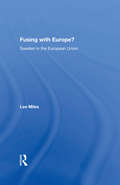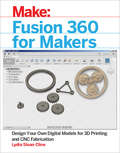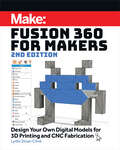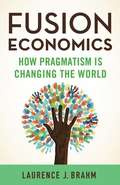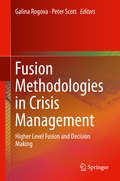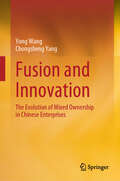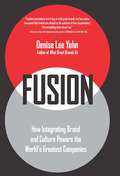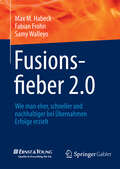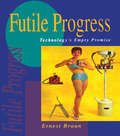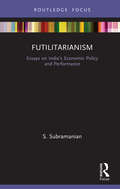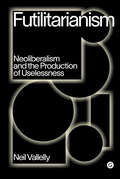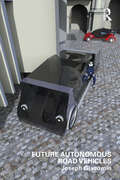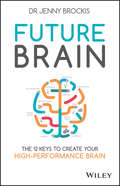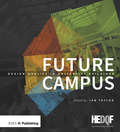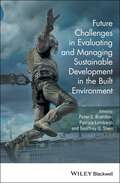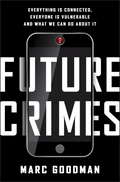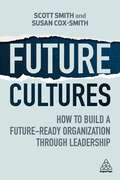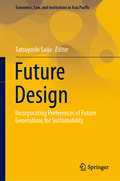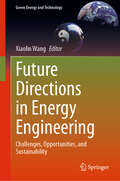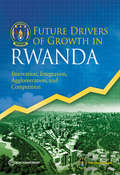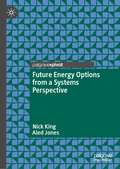- Table View
- List View
Fusing with Europe?: Sweden in the European Union
by Lee MilesInformed by his profound knowledge of contemporary political affairs and the current debate on European integration in Sweden, Lee Miles investigates Sweden's experiences of being a full member of the European Union since 1995. Widely regarded as one of the leading authorities on Scandinavian relations with the European Union (EU), the author proposes a micro fusion perspective offering an insightful new conceptual framework through which to understand Swedish views on European integration and the influences on national EU policy. The volume also includes a Foreword by Wolfgang Wessels, Jean Monnet Professor and the founder of the fusion theory.
Fusion 360 for Makers: Design Your Own Digital Models for 3D Printing and CNC Fabrication
by Lydia Sloan ClineLearn how to use Autodesk Fusion 360 to digitally model your own original projects for a 3D printer or a CNC device. Fusion 360 software lets you design, analyze, and print your ideas. Free to students and small businesses alike, it offers solid, surface, organic, direct, and parametric modeling capabilities.Fusion 360 for Makers is written for beginners to 3D modeling software by an experienced teacher. It will get you up and running quickly with the goal of creating models for 3D printing and CNC fabrication.Inside Fusion 360 for Makers, you'll find:Eight easy-to-understand tutorials that provide a solid foundation in Fusion 360 fundamentalsDIY projects that are explained with step-by-step instructions and color photosProjects that have been real-world tested, covering the most common problems and solutionsStand-alone projects, allowing you to skip to ones of interest without having to work through all the preceding projects firstDesign from scratch or edit downloaded designs. Fusion 360 is an appropriate tool for beginners and experienced makers.
Fusion 360 for Makers: Design Your Own Digital Models for 3D Printing and CNC Fabrication
by Lydia Sloan ClineLearn how to use Autodesk Fusion 360 to digitally model your own original projects for a 3D printer or a CNC device.
Fusion Economics
by Laurence J. BrahmEveryone knows something is wrong. Over forty percent of the world's population lives in poverty. Our planet's resources are diminishing at frightening rates. The international financial system is broken and only serves to exacerbate the gap between the wealthy and the rest. We are at a crucial tipping point. Is there a way out of this mess? In Fusion Economics, Laurence Brahm presents an alternative way to the economic practices and thinking that brought us to this point. Holistic, yet grounded and straightforward, this revolutionary book calls for a turn away from an economic system dangerously steeped in ideology, stymied by politics, and prone to fomenting violence. As he examines where things went wrong, Brahm outlines a new global consensus based on pragmatism, common sense, and grass-roots realities that requires a profound change in values and different measurements of success. Drawing on his experience overseeing China's transformation from socialism to market economy and its current Green Growth National Policy, Brahm suggests a synergistic integration of western and eastern economic systems. He takes readers on a global journey, traveling with them to China's secretive halls of power where Brahm helps to convert rusty debt-ridden state enterprises into international corporations, the central banks of Vietnam and Laos, grass-roots social enterprises in the Himalayas, micro-finance schemes in Bangladesh, the secluded kingdom of Bhutan where Gross National Happiness is invented, massive rallies in Africa calling for a new approach to development that shocks multilateral institutions, indignant movements in Spain and Russia and the protests at Occupy Wall Street. Fusion Economics demonstrates how a clever combination of market planning, localized diversification, green energy, and finance for small and medium sized community enterprises can restructure our financial architecture into a more sustainable model. Fusion Economics is a must-read for anyone who wants to be on the vanguard of change to build a more adaptive, organic, and inclusive future. At once pragmatic and progressive, it holds the promise of a new economic reality with a heart, a mind and a soul.
Fusion Methodologies in Crisis Management
by Peter Scott Galina RogovaThe book emphasizes a contemporary view on the role of higher level fusion in designing crisis management systems, and provide the formal foundations, architecture and implementation strategies required for building dynamic current and future situational pictures, challenges of, and the state of the art computational approaches to designing such processes. This book integrates recent advances in decision theory with those in fusion methodology to define an end-to-end framework for decision support in crisis management. The text discusses modern fusion and decision support methods for dealing with heterogeneous and often unreliable, low fidelity, contradictory, and redundant data and information, as well as rare, unknown, unconventional or even unimaginable critical situations. Also the book examines the role of context in situation management, cognitive aspects of decision making and situation management, approaches to domain representation, visualization, as well as the role and exploitation of the social media. The editors include examples and case studies from the field of disaster management.
Fusion Systems Corp. in Japan (A)
by Benjamin Gomes-Casseres Krista McquadeDescribes the international business of Fusion Systems Corp., a small high technology American firm, and a five-year patent dispute the company has in Japan with Mitsubishi Electric. Also describes key features of the intellectual property systems in Japan and related patenting strategies of firms. Finally, describes Fusion's strategy to seek help from the U.S. government. Ends with a decision of how Fusion should respond to Mitsubishi's latest negotiating moves.
Fusion and Innovation: The Evolution of Mixed Ownership in Chinese Enterprises
by Yong Wang Chongsheng YangThis book provides a comprehensive and in-depth analysis of the mixed ownership reform, a timely and critical topic in the Chinese economy. Authors approach the subject matter with a unique blend of theoretical perspectives and practical examples, offering insights into the future trajectory of SOEs in China. The book's content spans from the historical evolution of SOEs, the role of state-owned capital, to the impact of mixed ownership on social capital, and the institutional measures required for successful reform. It is intended for academics, students, and practitioners interested in Chinese economy and business. The most important features and benefits of the book include its comprehensive analysis, blend of theory and practice, and forward-looking perspective.
Fusion: How Integrating Brand And Culture Powers The World's Greatest Companies
by Denise LeeYohnA fresh, clarifying, and actionable perspective on two of the most misunderstood concepts in business: brand and culture. Independently, brand and culture are powerful, unsung business drivers. But, as author Denise Lee Yohn reveals, when you fuse the two together to create an interdependent and mutually-reinforcing relationship between them (what she calls fusion), you create new growth that isn't possible by simply cultivating one or the other alone. Through detailed case studies from some of the world's greatest companies (Sony, Frito-Lay, Oakley, FedEx, Airbnb, Adobe, Salesforce, LinkedIn, etc.), interviews with industry leaders, and insights from Denise's 25+ years working with world class brands, FUSION provides readers with a detailed roadmap for increasing competitiveness, creating measurable value for customers and employees, and future-proofing their business.
Fusionsfieber 2.0: Wie man eher, schneller und nachhaltiger bei Übernahmen Erfolge erzielt
by Max M Habeck Samy Walleyo Fabian FrohnGut die Hälfte aller Fusionen scheitert. Was machen erfolgreich zusammengewachsene Unternehmen anders? In diesem Buch identifizieren die Autoren die Schlüsselfaktoren eines erfolgreichen Fusionsmanagements. Anhand neuer Erfolgsfaktoren zeigen die langjährigen Fusionsexperten, wie Manager bei geplanten Fusionen vorgehen sollten, wie die Integration ablaufen kann und was dabei auf alle Beteiligten zukommt. Übersichtliche Zusammenfassungen und Fallbeispiele machen das Buch zu einem unverzichtbaren Begleiter bei Transaktionen mit anschließender Integration.
Futbol Club Barcelona
by Anita ElberseIn June 2015, FC Barcelona president Josep Bartomeu sees his team lift the UEFA Champions League trophy, completing an impressive trophy haul in the 2014-2015 season. Unique for a club of its caliber, five of the starting eleven are products of FC Barcelona's youth academy, La Masia. Yet none of the trophies and accolades guarantee future success. Bartomeu faces pressing questions about the club's business model-and in particular about the tensions between local and global activities-as well as decisions about the ongoing investment in the youth academy, funding for the club's Foundation and other sports, and its relatively low ticket prices. How could Bar a continue to win on and off the field in the increasingly competitive and global world of European football, while still protecting its local focus and traditions?
Futbol Club Barcelona
by Anita ElberseIn June 2015, FC Barcelona president Josep Bartomeu sees his team lift the UEFA Champions League trophy, completing an impressive trophy haul in the 2014-2015 season. Unique for a club of its caliber, five of the starting eleven are products of FC Barcelona's youth academy, La Masia. Yet none of the trophies and accolades guarantee future success. Bartomeu faces pressing questions about the club's business model-and in particular about the tensions between local and global activities-as well as decisions about the ongoing investment in the youth academy, funding for the club's Foundation and other sports, and its relatively low ticket prices. How could Bar a continue to win on and off the field in the increasingly competitive and global world of European football, while still protecting its local focus and traditions?
Futile Progress: Technology's empty promise (Earthscan Library Collection: International Environmental Governance Set Ser.)
by Ernest BraunDo new innovations and products improve our lives? Has our relentless pursuit of technological progress eliminated the blight of poverty, of inequality, of discrimination, of crime, of war? Has the advance of technology increased our happiness and led us to fulfillment and social harmony? The ads would have us think so. But not all technological innovation is desirable, and the fastest rate of change is not necessarily the best. Futile Progress explores the multiple and far-reaching ways in which our society and our environment have been affected by technological change. It reveals how far unfettered 'advances' can be blamed for environmental damage, and analyses to what extent our unquestioning acceptance of new technologies has contributed to the social insecurity, inequality and dislocation evident today. In this original and thought provoking book, Ernest Braun argues for effective safeguards against these adverse effects of technologies beneficial to society receive public support. Only if the consequences of technological change are anticipated can technology be harnessed to work for common good.
Futilitarianism: Essays on India’s Economic Policy and Performance
by S. SubramanianThis volume is an overview of, and commentary on, aspects of contemporary India and its socio-economic policies. It focuses on India’s economy and society in recent years, and in the process it addresses structural issues of development such as those of population, poverty, inequality, health, and social exclusion. It reviews the adequacy and appropriateness of governmental response to these problems, in terms of public policy, narrowly conceived, and philosophical orientation, more broadly conceived. The concern is not only with economic achievement and human development but also with the framework of civic rights, personal liberty, and institutional autonomy within which the exercise of governance is perceived to be carried out. The essays in this volume were originally written with the general-reader-as-involved-citizen very much in mind as the intended target. However, it should also be of interest to scholars of economics, political science, development studies, and South Asian studies.
Futilitarianism: Neoliberalism and the Production of Uselessness (Goldsmiths Press / PERC Papers)
by Neil VallellyA proposal for countering the futility of neoliberal existence to build an egalitarian, sustainable, and hopeful future.If maximizing utility leads to the greatest happiness of the greatest number of people, as utilitarianism has always proposed, then why is it that as many of us currently maximize our utility--by working endlessly, undertaking further education and training, relentlessly marketing and selling ourselves--we are met with the steady worsening of collective social and economic conditions? In Futilitarianism, social and political theorist Neil Vallelly eloquently tells the story of how neoliberalism transformed the relationship between utility maximization and the common good. Drawing on a vast array of contemporary examples, from self-help literature and marketing jargon to political speeches and governmental responses to the COVID-19 pandemic, Vallelly coins several terms--including "the futilitarian condition," "homo futilitus," and "semio-futility"--to demonstrate that in the neoliberal decades, the practice of utility maximization traps us in useless and repetitive behaviors that foreclose the possibility of collective happiness. This urgent and provocative book chimes with the mood of the time by at once mapping the historical relationship between utilitarianism and capitalism, developing an original framework for understanding neoliberalism, and recounting the lived experience of uselessness in the early twenty-first century. At a time of epoch-defining disasters, from climate emergencies to deadly pandemics, countering the futility of neoliberal existence is essential to building an egalitarian, sustainable, and hopeful future.
Future Autonomous Road Vehicles
by Joseph GiacominThis book provides a comprehensive overview of the past, present and future of autonomous road vehicles for professionals and students.Split into three parts, the first section of the book brings together the key historical developments in autonomous road vehicle design and the primary explorations of the design possibilities from science fiction. This historical analysis draws upon significant test vehicles from history and explores their roles as landmarks in the evolution of the field. In addition, it also reviews the history of science fiction and outlines the key speculations about autonomous road vehicles which emerged from that world. In the second section of the book, Joseph Giacomin introduces five of the most popular future-facing speculative approaches used by designers. In doing so, he identifies the major user-facing challenges which affect ideation, product design, service design and business modelling. In the final part, science fiction prototyping is identified as the speculative approach best suited to autonomous road vehicle application. Connecting theory with practice, Giacomin provides examples of sixteen science fiction prototypes, which cover a comprehensive range of physical, psychological, sociological and ethical design challenges.Written as an accessible guide for design practitioners and students, this book will be of use to those interested in the psychological, sociological and ethical factors involved in automotive design, human-centred design, industrial design and technology.
Future Brain
by Jenny BrockisSuper-charge your brain to gain a huge competitive edge in business and in life Future Brain is the busy professional's secret weapon for boosting mastery, efficiency, and productivity to gain that coveted competitive edge -- in business and in life. Designed to be implemented at the individual, team, or organisational level, this in-depth, step-by-step framework leverages neuro-scientific principles to help you develop a solid, habit-changing plan for building and maintaining brain fitness and healthy behaviours. Author Dr. Jenny Brockis will help you develop your thought processes and your regular routine to get more done with less effort and time. Based on the idea of neuroplasticity, these daily practices improve focus, creativity, and effectiveness to help you stay relevant, competitive, and way ahead of the pack. You already have a magnificent brain, but you probably take it for granted; we often develop "survival techniques" that force our brain to work with an incompatible "operating system" in an effort to keep up with the ever-increasing velocity of change and information overload. This book helps you beef up your brain awareness so you can take advantage of the built-in features and native capabilities that make the human brain a truly awesome machine. Reduce stress and avoid stress-related illnesses Foster healthy thinking habits to boost efficiency Build your expertise with renewed focus and stamina Drive innovation through productive collaboration A brain that can change, adapt, lead, and collaborate to operate with a high level of flexibility, agility, and creativity is a brain that will serve you well now and into the future. Future Brain turns neuroscience into actionable steps, helping you to train your brain to achieve high-performance in all areas of life.
Future Campus
by Ian TaylorThis book is to help architects, design teams and University clients (estates departments, and academics) in their pursuit of practical and innovative solutions for the creation of enabling higher education learning environments. It includes abundant examples of solutions to design problems and advice on best practice. This book argues that investment in the higher education sector is a driver for intellectual, social and economic development, offering opportunities for positive impacts for the physical environment on the character and performance of higher education. The editor believes that good outcomes result from good design, which should address elements such as learning from best current practice, the importance of clear briefing, good environmental performance, the positive social impacts and, also, the importance of ensuring a beautiful outcome. It has chapters contributed from leading-edge practices, including case studies with highly illustrated project examples. All this is underpinned by an understanding of the practicalities of working in the sector as well as the socio-political and economic context and trends shaping future practice.
Future Challenges in Evaluating and Managing Sustainable Development in the Built Environment
by Patrizia Lombardi Geoffrey Q. Shen Peter S. BrandonFuture Challenges in Sustainable Development within the Built Environment stimulates and reinterprets the demands of Responsible and Sustainable Development in the Built Environment for future action and development. It examines the methods of evaluation, the use of technology, the creation of new models and the role of human factors for examining and developing the subject over the next twenty years.
Future Crimes
by Marc GoodmanOne of the world's leading authorities on global security, Marc Goodman takes readers deep into the digital underground to expose the alarming ways criminals, corporations, and even countries are using new and emerging technologies against you--and how this makes everyone more vulnerable than ever imagined. Technological advances have benefited our world in immeasurable ways, but there is an ominous flip side: our technology can be turned against us. Hackers can activate baby monitors to spy on families, thieves are analyzing social media posts to plot home invasions, and stalkers are exploiting the GPS on smart phones to track their victims' every move. We all know today's criminals can steal identities, drain online bank accounts, and wipe out computer servers, but that's just the beginning. To date, no computer has been created that could not be hacked--a sobering fact given our radical dependence on these machines for everything from our nation's power grid to air traffic control to financial services. Yet, as ubiquitous as technology seems today, just over the horizon is a tidal wave of scientific progress that will leave our heads spinning. If today's Internet is the size of a golf ball, tomorrow's will be the size of the sun. Welcome to the Internet of Things, a living, breathing, global information grid where every physical object will be online. But with greater connections come greater risks. Implantable medical devices such as pacemakers can be hacked to deliver a lethal jolt of electricity and a car's brakes can be disabled at high speed from miles away. Meanwhile, 3-D printers can produce AK-47s, bioterrorists can download the recipe for Spanish flu, and cartels are using fleets of drones to ferry drugs across borders. With explosive insights based upon a career in law enforcement and counterterrorism, Marc Goodman takes readers on a vivid journey through the darkest recesses of the Internet. Reading like science fiction, but based in science fact, Future Crimes explores how bad actors are primed to hijack the technologies of tomorrow, including robotics, synthetic biology, nanotechnology, virtual reality, and artificial intelligence. These fields hold the power to create a world of unprecedented abundance and prosperity. But the technological bedrock upon which we are building our common future is deeply unstable and, like a house of cards, can come crashing down at any moment. Future Crimes provides a mind-blowing glimpse into the dark side of technological innovation and the unintended consequences of our connected world. Goodman offers a way out with clear steps we must take to survive the progress unfolding before us. Provocative, thrilling, and ultimately empowering, Future Crimes will serve as an urgent call to action that shows how we can take back control over our own devices and harness technology's tremendous power for the betterment of humanity--before it's too late.From the Hardcover edition.
Future Crimes
by Marc GoodmanNEW YORK TIMES and WALL STREET JOURNAL BESTSELLER ONE OF THE WASHINGTON POST'S 10 BEST BOOKS OF 2015One of the world's leading authorities on global security, Marc Goodman takes readers deep into the digital underground to expose the alarming ways criminals, corporations, and even countries are using new and emerging technologies against you--and how this makes everyone more vulnerable than ever imagined. Technological advances have benefited our world in immeasurable ways, but there is an ominous flip side: our technology can be turned against us. Hackers can activate baby monitors to spy on families, thieves are analyzing social media posts to plot home invasions, and stalkers are exploiting the GPS on smart phones to track their victims' every move. We all know today's criminals can steal identities, drain online bank accounts, and wipe out computer servers, but that's just the beginning. To date, no computer has been created that could not be hacked--a sobering fact given our radical dependence on these machines for everything from our nation's power grid to air traffic control to financial services. Yet, as ubiquitous as technology seems today, just over the horizon is a tidal wave of scientific progress that will leave our heads spinning. If today's Internet is the size of a golf ball, tomorrow's will be the size of the sun. Welcome to the Internet of Things, a living, breathing, global information grid where every physical object will be online. But with greater connections come greater risks. Implantable medical devices such as pacemakers can be hacked to deliver a lethal jolt of electricity and a car's brakes can be disabled at high speed from miles away. Meanwhile, 3-D printers can produce AK-47s, bioterrorists can download the recipe for Spanish flu, and cartels are using fleets of drones to ferry drugs across borders. With explosive insights based upon a career in law enforcement and counterterrorism, Marc Goodman takes readers on a vivid journey through the darkest recesses of the Internet. Reading like science fiction, but based in science fact, Future Crimes explores how bad actors are primed to hijack the technologies of tomorrow, including robotics, synthetic biology, nanotechnology, virtual reality, and artificial intelligence. These fields hold the power to create a world of unprecedented abundance and prosperity. But the technological bedrock upon which we are building our common future is deeply unstable and, like a house of cards, can come crashing down at any moment. Future Crimes provides a mind-blowing glimpse into the dark side of technological innovation and the unintended consequences of our connected world. Goodman offers a way out with clear steps we must take to survive the progress unfolding before us. Provocative, thrilling, and ultimately empowering, Future Crimes will serve as an urgent call to action that shows how we can take back control over our own devices and harness technology's tremendous power for the betterment of humanity--before it's too late.From the Hardcover edition.
Future Cultures: How to Build a Future-Ready Organization Through Leadership
by Scott Smith Susan Cox-SmithIt's hard to know what specific opportunities, technologies or challenges the future will bring. If you want to overcome the uncertainties of tomorrow, it's essential that you build a future culture. The potential for success is limitless for businesses which develop a culture designed for innovating and adapting to the future. Drawing upon decades of experience as futurists and consultants, Scott Smith and Susan Cox-Smith offer proven strategies that will allow you to fundamentally rewire your culture so that it becomes more fluent, agile and prepared to deal with whatever tomorrow will bring. From futureproofing your brand and manifesto to adapting the experience of your workforce, Future Cultures offers practical tools and techniques that will bring your focus out of the past and into the future. Through first-hand interviews and case studies from multinational companies such as IBM and the UN, this book will show how you can join the world's most innovative businesses by prioritizing tomorrow today.
Future Design: Incorporating Preferences of Future Generations for Sustainability (Economics, Law, and Institutions in Asia Pacific)
by Tatsuyoshi SaijoThis book discusses imaginary future generations and how current decision-making will influence those future generations. Markets and democracies focus on the present and therefore tend to make us forget that we are living in the present, with ancestors preceding and descendants succeeding us. Markets are excellent devices to equate supply and demand in the short term, but not for allocating resources between current and future generations, since future generations do not exist yet. Democracy is also not “applicable” for future generations, since citizens vote for candidates who will serve members of their, i.e., the current, generation. In order to overcome these shortcomings, the authors discusses imaginary future generations and future ministries in the context of current decision-making in fields such as the environment, urban management, forestry, water management, and finance. The idea of imaginary future generations comes from the Native American Iroquois, who had strong norms that compelled them to incorporate the interests of people seven generations ahead when making decisions.
Future Directions in Energy Engineering: Challenges, Opportunities, and Sustainability (Green Energy and Technology)
by Xiaolin WangFuture Directions in Energy Engineering: Challenges, Opportunities, and Sustainability presents new advances and research results in theoretical, experimental, and practical sustainable energy engineering. Contributions cover case studies to explore and analyze technological advancements alongside practical applications to help readers better understand the relevant concepts and solutions necessary to achieve clean energy and sustainable development. The book brings together the latest developments in the emerging areas of intelligent power systems, green energy, and technology. Coverage includes: Electric power generation, transmission, and distribution; Power system economics, operation, and control; Energy storage and cybersecurity for smart grids; Energy efficiency in building designs and management; Sustainable materials for buildings; Integration of renewable energy sources in buildings; Greening urbanization and urban settlements. The book offers approaches to help engineers and researchers in sustainable energy engineering technologies solve practical problems affecting their daily work.
Future Drivers of Growth in Rwanda: Innovation, Integration, Agglomeration, and Competition
by The World Bank;Government of RwandaA strong and widely acknowledged record of economic success-including a three-and-a-half-fold increase in per capita income since 1994--places Rwanda among the world’s fastest--growing economies. Traumatic memories of the 1994 genocide are gradually fading, as associations begin to take a more positive form--of a nation on the rise, powered by human resilience, a sense of common purpose, and a purposeful government. Past successes and a sense of frailty have fueled aspirations for a secure, prosperous, and modern future. Sustaining high rates of economic growth is at the heart of these ambitions. Recent formulations of the nation’s Vision 2050 set a target of achieving upper-middle-income status by 2035 and high-income status by 2050. Future Drivers of Growth in Rwanda: Innovation, Integration, Agglomeration, and Competition, a joint undertaking by experts from Rwanda and the World Bank Group, evaluates the country’s possibilities and options in this endeavor. The report identifies four essential drivers of growth--innovation, integration, agglomeration, and competition--and reforms in six priority areas: human capital development, export dynamism and regional integration, well-managed urbanization, competitive domestic enterprises, agricultural modernization, and capable and accountable public institutions.
Future Energy Options from a Systems Perspective
by Aled Jones Nick KingThis book is an exploration of energy and its unique role to date as one of the fundamental enabling and controlling factors in human development and progress at the scale of global civilization, and how it will be fundamental to the type of future that collective humanity is likely to experience. The first section provides a contextual overview of energy and human civilization through a chronological description of how human energy use has evolved over time and led to the current ‘energy bind’. The second section explores what this energy bind might mean for our future energy choices when trying to meet the various challenges of dwindling resources, costs, and climate change, through exploration of three broad systems-based scenarios for the human ‘energy future’. The final section draws conclusions as to which scenario is most achievable and desirable, and what this might mean for longer-term human prospects.
